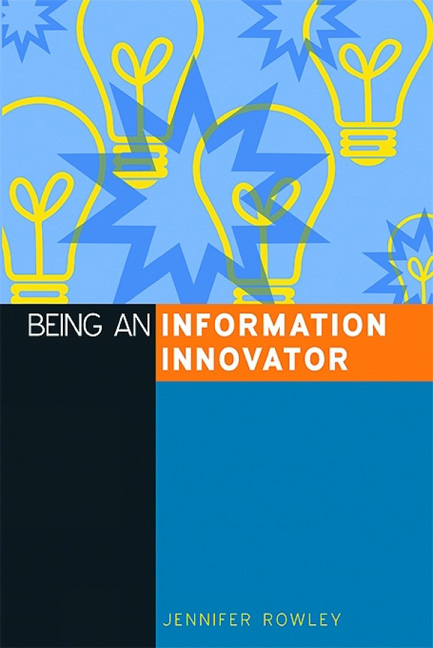1 - Innovation and entrepreneurship in information organizations
Published online by Cambridge University Press: 08 June 2018
Summary
Learning objectives
After reading this chapter you should be able to:
• Explain why innovation is important for information organizations, and understand the range of different types of, and approaches to, innovation.
• Understand the potential relevance of entrepreneurship and entrepreneurial action to information organizations.
• Reflect on the notion of creativity and consider its place in information organizations.
• Discuss the difference between a perspective based on change management and one based on entrepreneurship, innovation and creativity.
• Reflect on the challenges and opportunities for promoting innovation in information organizations.
Introduction
Information organizations of all kinds (such as libraries, publishers, subscription agents, and information and advice services) have changed significantly in recent years. Achieving these changes has involved high levels of innovation. Some of these innovations are driven directly by the opportunities provided by new technology innovations from other organizations, coupled with changes in consumer expectations and behaviours (e.g. access to full text of journals through Google as a search engine). Others are facilitated by information technology, but driven by policy and marketplace change (e.g. self-issue of books, institutional repositories). Other innovations are not particularly affected by technology platforms, but represent, for example, innovations in community involvement, such as new services for disadvantaged groups and the organization of bibliotherapy reading groups.
Despite there being a hive of activity, and regular reporting on achievements in the popular and professional press (the outcomes of innovation processes), there has been little discussion of innovation and its processes in the information management professional or academic literature. This means that there is limited opportunity to learn from one another's successes and mistakes, and that there is little evidence that information innovators are reflecting sufficiently on their innovation processes, and striving to enhance their own capacity and that of their organizations to innovate. Some commentators suggest that this means that (academic) libraries, for example, are too often making changes for change's sake, without proper evaluation of the impact and value of the change, and specifically without sufficient consideration as to how an innovation (even a small innovation) will help the library to fulfil its mission of supporting learning and research across the university community.
- Type
- Chapter
- Information
- Being an Information Innovator , pp. 1 - 30Publisher: FacetPrint publication year: 2010

